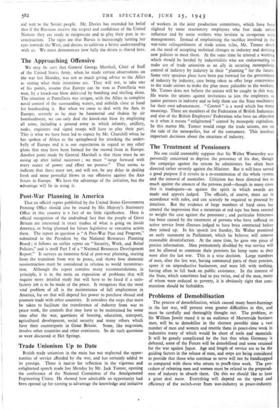Trade Unionism Up to Date
British trade unionism in the main has not neglected the oppor- tunities of service afforded by the war, and has certainly added to its prestige. There is matter for reflection in the vigorous and enlightened speech made last Monday by Mr. Jack Tanner, opening the conference of the National Committee of the Amalgamated Engineering Union. He showed how admirable an opportunity had been opened up for turning to advantage the knowledge and initiative of workers in the joint production committees, which have been slighted by some reactionary employers who fear trade union influence and by sonic workers who hesitate to co-operate with - managements. Instead of emphasising the sacrifice involved in the war-time relinquishment of trade union roles, Mr. Tanner dwelt
on the need of accepting technical changes in industry and devising new policies to meet them. At the same time he uttered a warning which should be heeded by industrialists who are endeavouring to make use of trade unionism as an ally in securing monopolistic control of industry by industry in their " planning " for the future. Some very specious pleas have been put forward for the government of industry by industry, care being taken to offer large concessions to the trade unions to make the plan more palatable to the workers. Mr. Tanner does not believe the unions will, be caught in this way. He warns the unions against invitations to join the employers as junior partners in industry and to help them use the State machinery for their own advancement. " Control " is a word which has many meanings. There are members of the Federation of British Industries and also of the British Employers' Federation who have no objection to it when it means "enlightened " control by monopoly capitalism. In this matter Mr. Tanner would range the trade unions, not on the side of the monopolies, but of the consumers. This involves important decisions about the structure of industry.






























 Previous page
Previous page